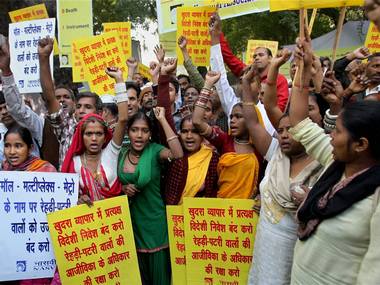The government’s move to allow foreign retailers 51 percent stake in multi-brand retail ventures has sparked uproar among politicians and some other sections of society.
Advocates say relaxing investment rules for the retail industry will promote investments in India’s poor supply chains and increase jobs, while critics claim that foreign retailers will only kill the livelihoods of small retail traders.
So are the merits of increased foreign investment in multi-retailing really as rosy as claimed? Firstpost presents some opposing arguments provided by academics to some of the most-common claims.
Claim 1: Organised retail chains like Wal-Mart will increase jobs.
[caption id=“attachment_145681” align=“alignleft” width=“380” caption=“Activists of NASVI during a protest against the government’s decision to allow 51 percent FDI in retail. PTI”]
 [/caption]
[/caption]
Not necessarily true, argues a 2005 paper by the Public Policy Institute of California titled “The effects of Wal-Mart on local labour markets,” authors David Neumark, Junfu Zhang and Stephen Ciccarella noted Wal-Mart reduced employment in the retail sector by 2-4 percent in the neighbourhoods studied. Their study also indicated wages per worker declined by 3.5 percent, although this conclusion was “less robust”.
The authors, however, acknowledged that they could not pinpoint what was causing the earnings declines, including the impact of changes in part-time work and shifts to less-skilled workers.
Impact Shorts
More ShortsHowever, the study also noted that the “earnings declines associated with Wal-Mart do not necessarily imply that Wal-Mart stores worsen the economic fortunes of residents of the markets that these stores enter. Wal-Mart entry may also result in lower prices that increase purchasing power, and if prices are lowered not just at Wal-Mart, but elsewhere as well, the gains to consumers may be widespread. "
Claim 2: Organised retail chains will not hurt small vendors.
That’s not true, according to a 2007 paper from the Centre for Policy Alternatives entitled “FDI in retail: Implications of Wal-Mart’s backdoor entry”, which notes that 98 percent of India’s retail trade is in the small and unorganised sector.
With organised retailing growing at 37 percent, even as the total retailing industry growing only at 5.7 percent, the paper argues that the entry of foreign retailers is a case of bad timing (although this argument was made in 2007).
“Our contention is not that Wal-Mart or other similar undertakings shouldn’t ever be allowed to venture into Indian markets, but that this is not the right time for them to be let in. A number of preconditions currently absent in theIndian industrial and agricultural sectors should be met, before we permit foreign investment in retail. If we fail to do so our small manufacturers and the hundreds of vendors and small retail shops will bear the brunt of the blow and millions will be rendered jobless,” it noted.
“From 4.7 percent of the total retail market now, it (organised retail) is expected to reach 9 percent by 2010. The current growth at 37 percent of organised retail, when the total retail market is just growing at 5.7 percent is clearly at the expense of the small retailer,” the paper added.
Claim 3: Organised retail will invest in and improve supply chains.
So far, that hasn’t been the case. According to a 2010 commentary paper by Sukhpal Singh from the Indian Institute of Management - Ahmedabad,food and vegetable-selling retail chains (barring a few exceptions) were found to be procuring from farmers through informal arrangements and without any commitment to buy regularly.In other words, supermarkets were found to be unwilling to share in the risks of growers. “This puts farming businesses under pressure which is passed on to the workers on the farms, who are often women.”
“There was also little involvement on the part of supermarket chains with producers and improvement in supply chain efficiency was absent,” the paper noted.
The paper also cited studies that showed a significant number of traditional food and vegetable vendors reported declines in footfalls, sale and incomes across key cities such as Bangalore, which had high levels of supermarket penetration.
Claim 4: Organised retail improves competition.
The IIM paper noted that in 2007, five major chains accounted for more than 50 percent of retail sales in most of European Union countries, as up to 80 percent of the retail markets in Denmark and Finland.
Own brands of these supermarkets accounted for a major share of the total sales - 43 percent in the UK, 40 percent in Denmark and 42 percent in Belgium.“Rapid rise of supermarket chains would lead to concentration of market power, with upstream suppliers facing buyer power in terms of lower prices and higher private standards, and the downstream buyers (consumers) facing higher prices due to lower competition,” it noted.
)